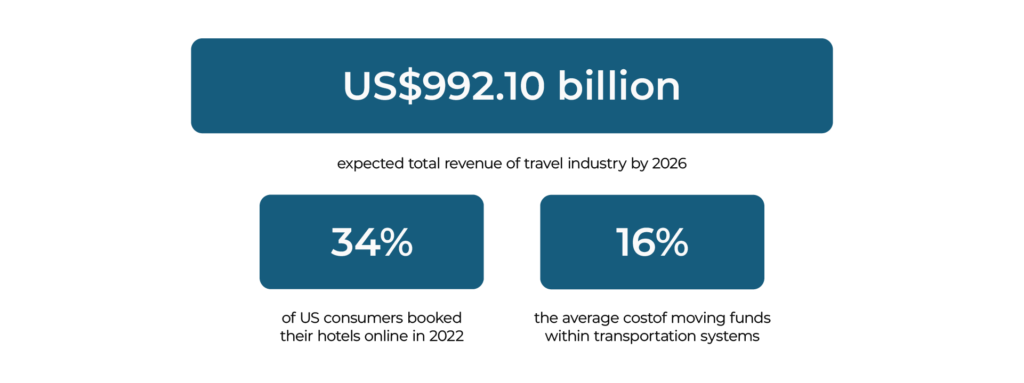Let’s face it: the last couple of years have been tough for the travel industry. Still recovering from the Covid-19 pandemic, businesses are looking for ways to go from staying afloat to riding the wave again. Help may come from an unexpected ally: the adoption of blockchain in travel promises to give the industry a major boost.
This article is largely inspired by Unicsoft’s cooperation with Chain4Travel, a prominent startup that developed Camino — a unique blockchain for travel applications.
Pablo Castillo, the company’s CTO, has kindly shared some first hand info on developing the new ecosystem, as well as his general insights on the industry’s transformation.
Stay tuned, and we’ll tell you all about the perks of using blockchain technology in travel projects. We’ll also discuss the adoption challenges and look at some use cases where blockchain shines.
Let’s get straight to the point.
How can blockchain help the travel industry move with the times?

The travel sector is uniquely multi-faceted: it incorporates elements of transportation, accommodation, food and beverage, and entertainment. Naturally, such a massive industry (total revenue is expected to reach US$992.10 billion by 2026) suffers from a bit of inertia.
Innovation in travel takes a moment to set in, and old ways aren’t easily abandoned. For instance, only 34% of US consumers booked their hotels online in 2022, Statista reported.
At the same time, the overall travel demand is bouncing back and sometimes exceeds pre-pandemic levels. However, staff shortages caused by downsizing severely slow down the rebound. Flight cancellations, longer wait times at security checks, and lost baggage are only some of the problems that plague the sector.
This is where blockchain technology steps in. It cannot substitute pilots or other skilled workers but it can help serve customers faster by optimizing booking, identification, payment, and other processes.
Quick reminder: blockchain is a distributed digital ledger where transactions are recorded on all the computers (nodes) on the network, guaranteeing security. One of the best things about blockchain is the ability to use smart contracts — self-executing agreements built into the code.
We believe that using blockchain in travel can offer a number of tangible benefits. Let’s have a look.
Tokenization of services and goods
Whether you’re an OTA (online travel agent) or a small hotel owner, blockchain tech can aid in selling your goods and services by turning them into tokens.
In short, tokenizing an asset means creating its digital representation on the blockchain. The token guarantees ownership rights for a corresponding asset.
For instance, a utility NFT can represent a seat on a flight or the right to stay at a property for a certain number of days. Or entitle its owner to additional services — a bottle of wine, a massage session, or a bike tour.
This business model is equally beneficial for the seller and the buyer. You get to sell your products and services via a convenient digital medium, while your customers can easily pay with crypto and enjoy their benefits right away.
Secure and immutable payment transactions at low costs
Conventional payment systems aren’t ideal for the travel business, where money often changes many hands to make one sale. According to IBM’s research, the average cost of moving funds within transportation systems is a staggering 16%. Bank transfer and credit card fees, and currency exchange rates all chip away at the profits.
Using blockchain for payments cuts these expenses, as it takes out financial institutions as intermediaries. And guess what — you can forget complex verification procedures and save yourself loads of time. The technology also makes cross-border payments simple and accessible for travel companies of any size.
What’s even better, blockchain transactions are perfectly secure. The distributed approach guarantees that information is stored in multiple locations, and smart contracts ensure that payments go through only if all conditions are fulfilled.
Immediate access to shared information
Imagine a platform such as Booking.com, with millions of property listings and terabytes of data scattered across thousands of servers. When information like prices, photos, or terms is updated, there’s an inevitable delay before the updates reach every server.
Now, if you were to build your own blockchain, any updates would be immediately available across the entire decentralized ledger. Every change would be stored in the ledger in chronological order, and these records couldn’t be altered.
So if, for example, you just renovated your property and uploaded the photos, all users on the blockchain network would get an instant update. With smart contracts, you can easily program the kind of content and the level of access users will get.
Increased customer privacy
Don’t you get tired of having to constantly share personal information with websites when booking trips? It’s not necessary with blockchain. When you authenticate with your crypto wallet, the blockchain already has all the information it needs, so you won’t have to fill out forms.
Using blockchain in travel paves the way for a more secure and transparent identification process. We’ll cover this in more detail later.
Convenience and a host of new services
At Unicsoft, we believe that blockchain, cryptocurrencies, and NFTs can have a similar effect on the travel industry to what credit cards did for consumer spending.
Fast, convenient, and secure transactions will help build trust between service providers and customers. Building on that, companies can win the hearts of their audience by offering better products and services.
For instance, the user-centric Web3 paradigm, with its real-time data updates, can create deeply personalized experiences. Like picking up the most suitable rental car based on your previous choices and information about the upcoming trip. Or booking a room with south-facing windows for you. Or automatically choosing a vegetarian option for breakfast.
However, blockchain must be an integral part of the travel landscape for such innovations to become a reality.
The current state of blockchain adoption in the industry
While many industries like finance, automotive, and healthcare already use blockchain to their advantage, things aren’t so peachy for travel.
Our guest, Pablo Castillo, comments: “No comprehensive statistical data is available, but from my experience — yes, adoption is low at the moment. But look at it this way: there are roughly 150-200 million active crypto wallet users today. About the same number of people were online in the late 1990s, in the early days of the internet. We all know how that worked out. But while the curve was linear then, I think we’re about to see exponential growth in the adoption of blockchain in travel in the next five years.”
We couldn’t agree more. The potential of blockchain for the travel industry is huge. Forward-thinking businesses need to jump on the bandwagon to secure leading positions in the market.
To illustrate our point, we’ve made a list of scenarios where blockchain tech can make a real difference.
Top use cases for blockchain technology in travel
The use of blockchain creates new avenues for selling your travel products and services. But the benefits don’t end there. Some of these use cases are still hypothetical, while others already exist in this or that form.

Direct home rental marketplaces
The post-pandemic shift to remote work caused an uptick in the popularity of private rentals. In 2021, the share of customers using private rentals jumped from 28% to 43% by the end of the holiday season, Deloitte reported.
The travel industry is responding to this demand. Dtravel is a community-owned platform where homeowners can list their properties and receive profits directly. Thanks to blockchain, Dtravel can finally give control to those who offer the service, as opposed to the business model of large aggregators.
The community enjoys low fees, unmoderated communication with customers, and vote-based internal governance.
Simplified digital identification
As we’ve mentioned before, blockchain offers the level of security and immutability needed for identity verification. This is how we think it’ll work in practice:
- Once a person goes through the know-your-client (KYC) process when activating their crypto wallet, they can forget about carrying a physical ID.
- At an airport, they can use a mobile wallet app to generate a QR code and feed it to a scanner.
- The airport’s blockchain-based software will verify their identity and pull all the necessary data from the ledger: flight history, baggage info, current itinerary, food allergies, etc.
- The customer can then go straight to the gate, bypassing check-in queues. Security might let you off with a basic check, and flight attendants will know what meals you’re more likely to order. Your miles will be added automatically.
By the way, LAX airport has successfully tested a similar solution to verify the validity and authenticity of Covid-19 tests.
Improved payment settlement
Using the decentralized framework of blockchain and existing cryptocurrencies, we can make payments without the mediation of traditional financial institutions. Settling payments in the travel supply chain can finally be cheap and happen in real-time.
This also makes life easier for customers: refunds don’t have to be a headache, booking last minute is a breeze, and holding fares isn’t a problem.
Travel ledger is a working blockchain-based settlement project for the travel industry. It deals with non-air transactions, offering automated invoicing and settlement services at low fees.
Efficient inventory management
Blockchain solutions can help manage any travel-related inventory — from available hotel rooms and airplane seats to toiletry items. With every move recorded immutably to the blockchain ledger, you can effectively prevent overbooking, minimize refunds, and automate orders for new supplies.
And how about tracking baggage—probably the biggest struggle of airline companies worldwide? Well, blockchain can help with that, too.
Blockchain technology opens a new dimension of transparency and financial efficiency for travel businesses. Customers, in turn, will receive better service and be more likely to return and refer friends.
Transferable benefits
Vouchers, tickets — everything can easily change owners on the blockchain.
Customers can safely resell their vouchers as travel NFTs. The blockchain’s ledger and smart contracts will safeguard the interests of both parties.
As a buyer, you can be certain that you’ll get your payment immediately. Sellers don’t have to worry about the asset’s authenticity or wait for it to be delivered as a physical object. Owners can redeem their NFTs at any time or possibly rent them out to third parties.
Customer loyalty programs
Incentive programs are another great use case for adopting blockchain in travel. Now that any asset can be a token, loyal customers can be rewarded with NFTs or other platform-specific tokens.
These tokens can represent discount vouchers or extra benefits that customers can redeem instantly. Minting your own NFTs is easier than it sounds, and providing loyalty rewards on the blockchain is far cheaper than conventional methods. Marketing these digital assets is also a no-brainer, given the popularity of NFTs these days.
Tokenization of carbon emissions
Sustainable transportation is a growing trend today, and the tourism industry is a major source of carbon emissions. The use of blockchain in your travel business can facilitate carbon neutrality.
One of the ways to do it is to offer carbon credits on your blockchain network. For instance, you can give customers an option to buy a small share of your carbon tokens with your services or products. This is a good cause, and your business will attract like-minded persons who share your concern for environmental issues.
We have a whole article on carbon credit tokens, so if this topic fascinates you, make sure you give it a read.
We can’t possibly describe every use case in one article, but we do hope that the ones we covered sound convincing. Now, let’s spend a minute discussing the obstacles you may encounter when adopting blockchain in travel.

What challenges will travel companies face while adopting blockchain?
The use of blockchain and crypto are relatively novel concepts in the world of travel. Be prepared to overcome some initial resistance and put in the time to search for solutions that will fit your needs.
Low awareness of blockchain among travel professionals
As our guest expert Pablo explained, blockchain adoption rates are low in the travel business community. Which means there’s too little knowledge about the phenomenon. You might need to get buy-in from your stakeholders, and that’s where Unicsoft’s blockchain consulting services will come in handy.
Finding a use case that will benefit from blockchain technology
To successfully integrate blockchain into your business model, you first need to have a clear vision of the gains it will bring. The question is, more precisely, how will adopting blockchain help you excel at what you do?
Will secure and transparent payment settlement procedures get you there? Is a lightning-fast and reliable information management solution critical for you as a travel merchant? Or will your airline reap considerable benefits from selling tickets and in-flight services as travel NFTs?
Addressing your pain points, removing bottlenecks, unlocking revenue streams — blockchain can do it all, but you must decide what to pursue. Getting a second opinion from a company that has experience with blockchain development couldn’t hurt.
Lack of tech talent needed by businesses to undergo the conversion
It takes specific expertise to build a blockchain solution, and you can’t expect your in-house team to be jacks of all trades. Sooner or later, you’ll either have to hire externally or outsource blockchain development to a reliable third party.
As you can see, all the potential problems we mentioned can be overcome. Our partners from Chain4Travel prove it every day.
We hope you now have a pretty good grasp on the role of blockchain in travel, its benefits, and the challenges of adoption. But why speak in ‘what-ifs’ when we have a real-life example right in front of us?
Camino: a blockchain created for the travel industry
Pablo Castillo has been kind enough to tell our readers about the Camino project in great detail. We’ve summarized his story.

What is Camino?
Camino is an innovative layer 1 consortium blockchain developed by Chain4Travel. It is based on Avalanche, with original technology modified to explicitly address the needs of the travel domain.
The Camino network is an open and collaborative space for developing new travel related products as decentralized applications (dApps).
Chain4Travel has garnered more than 100 supporters and selected over 70 validators so far — all companies with unique travel expertise ready to adopt Camino and help it grow.
Why Camino is a great choice of blockchain for travel
When it comes to addressing the challenges specific to the travel industry, Camino beats general-purpose blockchains hands down.

Here’s why we make this claim with such confidence :
- It’s built with the needs of travel companies in mind
A team of experienced travel executives and technology experts work together to make Camino better suited to the needs of the travel industry. Each partner adds something new to the network, so in the end, we’ll get a holistic ecosystem with the widest range of services.
- Partners can build their own dApps within the ecosystem
They can do so either with the help of their in-house teams or by outsourcing development to tech companies versed in blockchain development. The participants invest in stakes, so they can vote to promote solutions they consider promising.
- It’s made to provide travel services without intermediaries, directly through smart contracts on the blockchain
Camino offers all the tools needed to work without the conventional constraints of the industry. Forget the draconian fees of large aggregators and enjoy fast and secure payment options. Instead of connecting to hundreds of APIs to enable simple additional services, execute smart contracts directly and momentarily on the blockchain.
- The network offer increased security thanks to a semi-permissionless approach
Camino is not a public but a consortium blockchain. The validators all go through a KYC or KYB process. This guarantees improved security compared to public blockchains with anonymous users. Validators don’t take part in mining, which reduces the network’s exposure to DDoS attacks, malware, and other vulnerabilities.
- Validators have a direct say in controlling gas fees and curating the content
Keeping gas fees (the transaction cost paid to validators) low is important for travel applications. We’re able to do it due to exceptional performance that reduces the system load, and thanks to our validators who come from the travel industry. It’s in their common interest to keep the system working, not to make profits from gas fees.
Unicsoft here, with an unbiased opinion. In our mind, one of the best things about Camino is this:
This blockchain helps democratize the travel market by bringing in smaller local companies and offering them the same opportunities as bigger players. The travel market has been waiting for a solution like this for far too long.
Summing up
The benefits of blockchain for travel businesses are innumerable. The utility of asset tokenization, the flexibility of smart contracts, the security and speed offered by blockchains make them perfect tools for the modern market.
You don’t have to invent the wheel to make the best of the technology and get ahead of the competition. All you need is a vision and tech partner that can bring your idea to life. Unicsoft would be proud to be that partner. Challenging and innovative projects are our cup of tea, and we know everything there is to know about blockchain development.
Using the Camino blockchain for travel applications is a great idea, too. We met its creators, we saw it in action, and we love the philosophy behind it and the capabilities it already offers.
Talk to us, and let’s start building your travel dApp today.





![Blockchain in Travel: The Journey to Web3 Begins What’s the EU Artificial Intelligence Act and How to Comply? [Webinar]](https://unicsoft.com/wp-content/uploads/2024/03/Cover_1140_v1.1-370x280.png)

